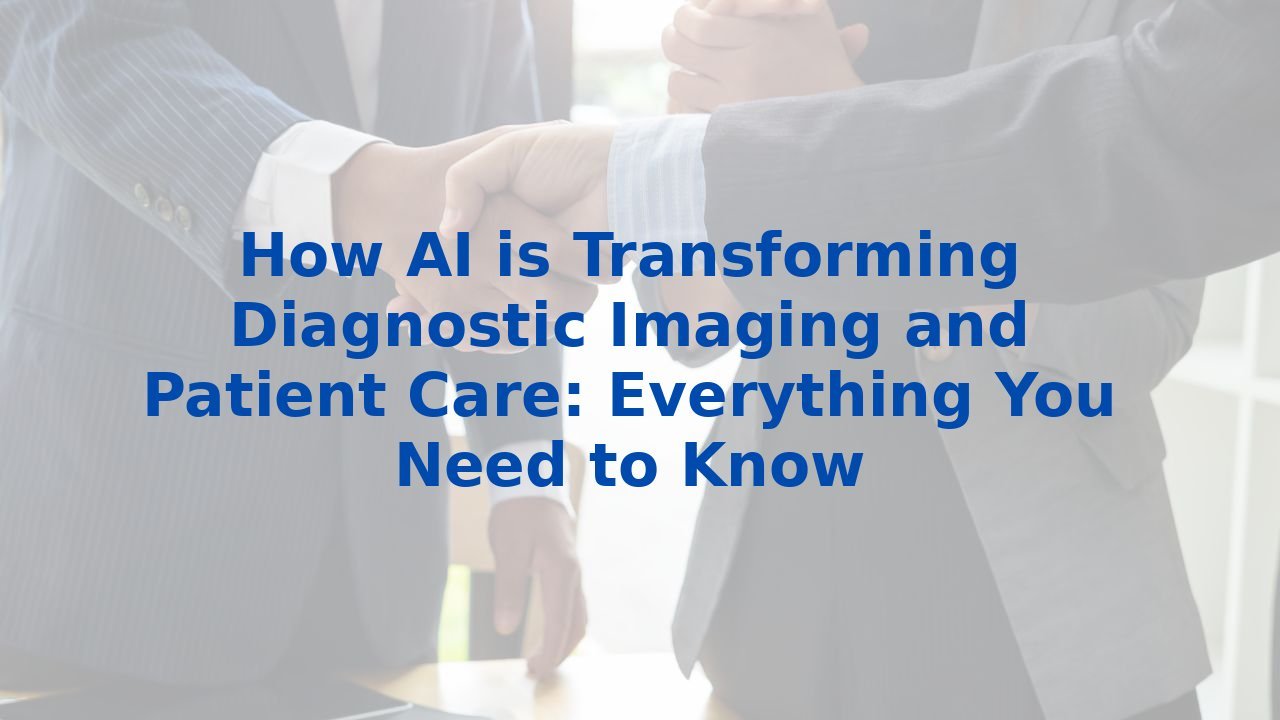How AI is Transforming Diagnostic Imaging and Patient Care: Everything You Need to Know
How AI is Transforming Diagnostic Imaging and Patient Care: Everything You Need to Know
Introduction
Artificial intelligence (AI) is not just a buzzword; it’s reshaping our world, especially within healthcare. The area of diagnostic imaging is witnessing a remarkable transformation, where AI is proactively enhancing the accuracy of diagnoses and amplifying the overall quality of patient care. This article delves into the intricate ways AI is revolutionizing diagnostic imaging and how these advancements are poised to elevate healthcare delivery systems across both human and veterinary medicine.
The Role of AI in Diagnostic Imaging
AI has emerged as a powerhouse in the realm of diagnostic imaging, offering substantial benefits that go beyond human capabilities. Here are some pivotal ways AI is enhancing this crucial medical function:
- Automated Analysis: AI algorithms excel in analyzing medical images—think X-rays, CT scans, and MRIs—with speed and precision. This automation significantly reduces the time needed to reach a diagnosis, allowing healthcare professionals to make faster, more informed treatment decisions.
- Image Enhancement: AI doesn’t just analyze; it enhances. By improving image quality, AI allows radiologists to discern abnormalities that may otherwise go unnoticed, particularly in cases stressing lower-quality imaging.
- Pattern Recognition: The technology harnesses sophisticated models to identify complex patterns in imaging data. Tumors, fractures, lesions—these life-saving recognitions can happen at a pace that human eyes may miss, fundamentally altering patient outcomes for the better.
Benefits of AI in Patient Care
The implementation of AI in diagnostic imaging translates into tangible benefits for patient care:
- Early Detection: Timely diagnoses lead to earlier interventions. With AI’s acumen in identifying diseases at their inception, patients stand a better chance of receiving effective treatment that can save lives.
- Personalized Medicine: AI dives deep into patient data, creating tailored treatment plans that reflect individual needs and histories. This not only optimizes the therapeutic approach but also fosters a sense of personalized care.
- Reduced Errors: By minimizing the risk of human error in diagnosis, AI enhances patient safety and elevates satisfaction levels among healthcare recipients. Consistency and reliability are what patients deserve in quality care.
Training Employees for AI
While AI technology is impressive, its true potential is realized when employees are well-trained in its applications. Investing in employee training brings multifaceted benefits:
- Enhanced Skills: By educating staff on AI usage, organizations cultivate a more skilled workforce capable of efficiently working with advanced tools. This is particularly vital for healthcare professionals in imaging roles who need to decode AI-generated insights.
- Adaptability: In a rapidly evolving medical landscape, training fosters resilience and adaptability in staff. Those who are skilled in current technology can better navigate changes and innovations in the field.
- Improved Decision-Making: Trained employees benefit from a deeper understanding of AI-driven data, allowing them to make more informed choices that positively affect patient outcomes. Knowledge empowers decisions.
Future Potential of AI in Healthcare
The horizon of AI in healthcare looks expansive. Continued innovation coupled with focused research is set to unveil even more promising advancements. Consider the following future possibilities:
- Integration with Other Technologies: Expect seamless incorporation of AI with existing healthcare technologies like electronic health records (EHRs) and telemedicine systems, allowing for a streamlined patient care experience.
- Continued Innovation: As AI algorithms develop, healthcare delivery will achieve new heights of diagnostic accuracy and effectiveness, creating a ripple effect that leads to better care, expanded access, and potentially lower costs.
Conclusion
The advent of AI in diagnostic imaging marks a pivotal moment in the evolution of healthcare. As it enhances diagnostic precision, revolutionizes patient care, and diminishes errors, organizations stand to gain immeasurably. However, to capture the full potential of these technologies, thorough training for healthcare professionals is essential. With a workforce empowered to harness AI, the future of healthcare is not just promising; it is transformative.
To explore more about how AI can be integrated into your organization effectively, consider investing in comprehensive AI training programs that equip your entire workforce with necessary skills, ensuring that they thrive in the era of AI-enhanced healthcare.



